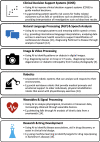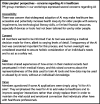New Horizons in artificial intelligence in the healthcare of older people
- PMID: 38124256
- PMCID: PMC10733173
- DOI: 10.1093/ageing/afad219
New Horizons in artificial intelligence in the healthcare of older people
Abstract
Artificial intelligence (AI) in healthcare describes algorithm-based computational techniques which manage and analyse large datasets to make inferences and predictions. There are many potential applications of AI in the care of older people, from clinical decision support systems that can support identification of delirium from clinical records to wearable devices that can predict the risk of a fall. We held four meetings of older people, clinicians and AI researchers. Three priority areas were identified for AI application in the care of older people. These included: monitoring and early diagnosis of disease, stratified care and care coordination between healthcare providers. However, the meetings also highlighted concerns that AI may exacerbate health inequity for older people through bias within AI models, lack of external validation amongst older people, infringements on privacy and autonomy, insufficient transparency of AI models and lack of safeguarding for errors. Creating effective interventions for older people requires a person-centred approach to account for the needs of older people, as well as sufficient clinical and technological governance to meet standards of generalisability, transparency and effectiveness. Education of clinicians and patients is also needed to ensure appropriate use of AI technologies, with investment in technological infrastructure required to ensure equity of access.
Keywords: ageing; artificial intelligence; health; older people; technology.
© The Author(s) 2023. Published by Oxford University Press on behalf of the British Geriatrics Society.
Conflict of interest statement
None.
Figures





References
-
- European Parliament Directorate-General for Parliamentary Research Services . Artificial intelligence in healthcare – Applications, risks, and ethical and societal impacts. European Parliament: Publications Office, 2022. 10.2861/568473. - DOI
-
- Philips . Future Health Index 2021 Global Report: A Resilient Future. https://www.philips.com/a-w/about/news/future-health-index/reports/2021/.... (30 March 2023, date last accessed).
-
- ChatGPT . https://chat.openai.com/. (3 September 2023, date last accessed).

